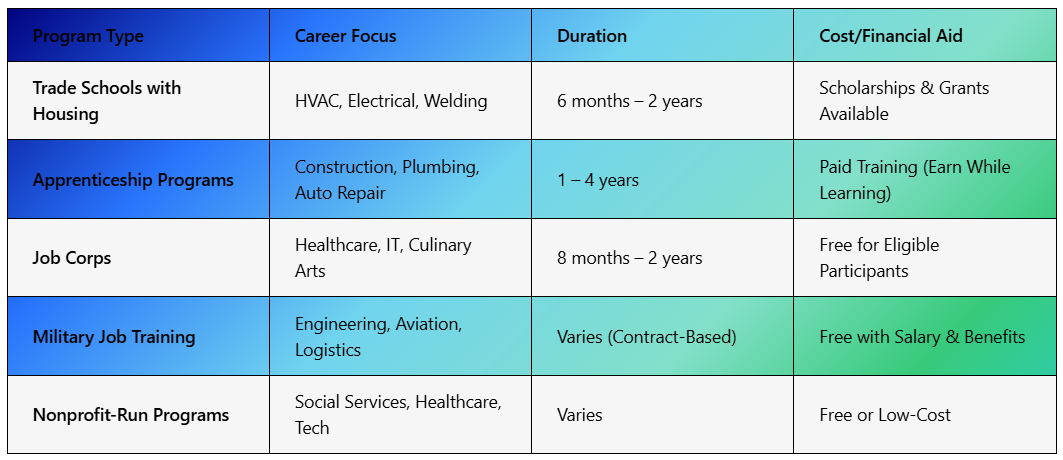
Understanding Residential Job Training Programs
Understanding Residential Job Training Programs is crucial for anyone aiming to enhance their skills and boost employability. These programs offer hands-on experience and practical knowledge across various fields, making them ideal for individuals entering the workforce or looking to switch careers.
By participating, you gain valuable insights into specific industries, significantly improving your confidence and job prospects. A key feature of Residential Job Training Programs is their emphasis on real-world applications. Many vocational training programs include internships or apprenticeships, allowing participants to work alongside professionals in their chosen fields. This experience not only helps build a network but also provides a glimpse into future job expectations. Here are some benefits of enrolling in these programs:
- Hands-on experience that enhances learning
- Networking opportunities with industry professionals
- Tailored courses that align with local job market demands
- Flexible schedules to fit various lifestyles
Technical schools provide a range of courses catering to diverse interests, from healthcare to information technology. For instance, a medical assisting program can lead to a fulfilling career in healthcare, while computer programming courses can pave the way for opportunities in tech. When considering a Residential Job Training Program, reflect on your career goals and desired skills. Researching local options and connecting with alumni can offer valuable insights into finding the best fit for you.
Unlock your potential with online degrees—Learn more!
Top Benefits of Enrolling in Job Training Programs
Enrolling in job training programs can significantly enhance career prospects, especially through residential job training programs that provide a structured environment for hands-on experience and practical skills. These vocational training programs cater to various needs, whether you are a recent high school graduate or someone looking to switch careers.
Technical schools, for example, focus on specific trades such as plumbing, electrical work, or healthcare, equipping students with essential knowledge for their fields. A major advantage of these programs is the real-world experience they offer. Many vocational training programs include internships or apprenticeships, allowing students to apply their learning in professional settings, which boosts confidence and employability. Furthermore, these programs often maintain strong ties with local businesses, facilitating job placements post-graduation. Here are some key benefits to consider:
- Skill Development: Acquire practical skills that are in high demand.
- Networking Opportunities: Build connections with industry professionals and potential employers.
- Flexible Learning: Evening or weekend classes are often available for working individuals.
- Financial Aid Options: Scholarships and grants can help cover costs.
- Career Support: Access to job placement services and career counseling.
In summary, investing in residential job training programs can lead to a successful career by providing valuable skills and a supportive professional network.
How to Choose the Right Residential Job Training Program
Choosing the right residential job training program can feel overwhelming, especially with so many options available. However, taking the time to research and evaluate your choices can lead to a rewarding career. Start by considering what skills you want to develop. For instance, if you are interested in healthcare, look for vocational training programs that specialize in nursing or medical assisting.
On the other hand, if technology excites you, technical school courses in IT or software development might be the way to go. Next, think about the format that suits you best. Residential job training programs often provide hands-on experience, which is invaluable. Look for programs that offer internships or apprenticeships, as these can give you a taste of real-world work environments. Additionally, consider the following factors when making your decision:
- Accreditation: Ensure the program is recognized and respected in your field.
- Job Placement Rates: High placement rates can indicate a program’s effectiveness.
- Instructor Experience: Learn from those who have been in the industry and can provide practical insights.
Lastly, don’t forget to read reviews and testimonials from former students. Their experiences can provide a clearer picture of what to expect. Remember, the right program should not only align with your career goals but also inspire you to grow and learn. By taking these steps, you can confidently choose a residential job training program that sets you on the path to success.

Exploring Different Types of Residential Job Training Programs
When it comes to finding the right path for your career, exploring different types of residential job training programs can be a game changer. These programs are designed to provide hands-on experience and practical skills that are essential in today’s job market. Whether you are looking to switch careers or enhance your current skills, residential job training programs offer a variety of options tailored to meet diverse needs.
From vocational training programs to technical school courses, there is something for everyone. One of the most appealing aspects of these programs is their immersive nature. Participants often live on-site, allowing them to fully engage with the curriculum and build strong connections with instructors and peers. Here are some benefits of enrolling in a residential job training program:
- Hands-on Experience: Gain practical skills through real-world projects.
- Networking Opportunities: Connect with industry professionals and fellow students.
- Focused Learning Environment: Eliminate distractions and immerse yourself in your studies.
- Comprehensive Support: Access to mentors and career services to guide your journey.
For example, vocational training programs in fields like culinary arts or automotive technology often include residential components, allowing students to practice their skills in fully equipped facilities. Technical school courses in areas such as information technology or healthcare also provide intensive training that prepares graduates for immediate employment. By choosing the right program, you can set yourself up for success and find a fulfilling career that aligns with your passions.
Success Stories from Residential Job Training Graduates
Success stories from graduates of residential job training programs highlight the transformative power of vocational training. Many individuals enter these programs seeking a fresh start, and they often leave with not just skills, but also newfound confidence and direction.
For instance, consider the journey of Maria, who enrolled in a technical school course focused on healthcare. After completing her training, she secured a position as a medical assistant, which has allowed her to support her family while pursuing her passion for helping others. The benefits of participating in residential job training programs are numerous. Graduates frequently report improvements in their job prospects and earning potential. Here are some key insights from successful alumni:
- Skill Development: Participants gain hands-on experience that is directly applicable to their chosen fields.
- Networking Opportunities: Many programs connect students with industry professionals, opening doors to job placements.
- Supportive Environment: The residential aspect often fosters a community of learners who motivate each other.
- Job Placement Assistance: Many programs offer resources to help graduates find employment after completion.
These stories underscore the importance of choosing the right vocational training program. Graduates like Maria serve as a testament to the effectiveness of these educational paths. By investing time in a residential job training program, individuals not only acquire valuable skills but also embark on a journey toward a fulfilling career. Whether it is through technical school courses or specialized vocational training, the impact on their lives can be profound and lasting.
Unlock your potential with online degrees—Learn more!
Key Skills Developed in Residential Job Training Programs
Residential job training programs are tailored to equip individuals with essential skills for success across various industries. These programs emphasize practical, hands-on training that prepares participants for real-world job scenarios.
By participating in these training opportunities, individuals gain valuable experience and confidence, enhancing their appeal to potential employers. Whether entering the workforce for the first time or switching careers, these programs lay a solid foundation for professional growth. A significant advantage of residential job training programs is the development of in-demand skills. Participants can expect to enhance their abilities in areas such as:
- Technical skills: Learning to operate industry-relevant machinery or software.
- Soft skills: Improving communication, teamwork, and problem-solving abilities.
- Industry knowledge: Gaining insights into the latest trends and practices within specific fields.
These skills not only aid in securing employment but also facilitate career advancement. Many vocational training programs include internships or apprenticeships, allowing participants to apply their skills in real work environments, often leading to job offers upon completion. Moreover, residential job training programs create a supportive learning atmosphere.
Participants benefit from networking opportunities with industry professionals and peers, which can lead to valuable connections and job leads. Many technical schools and vocational training programs also provide career services, including resume writing workshops and interview preparation, further boosting graduates’ employability. Overall, these programs act as a bridge between education and employment, empowering individuals to take charge of their careers and achieve their professional aspirations.
Read Also: What Are the Top Platforms for Personalized Learning?
Funding Options for Residential Job Training Programs
When considering the best residential job training programs, understanding the funding options available can significantly ease the financial burden. Many individuals are unaware that various resources exist to help cover the costs associated with vocational training programs and technical school courses. These funding avenues can make a substantial difference in accessing quality education and training, ultimately leading to better job opportunities. Here are some common funding options to explore:
- Federal Financial Aid: Programs like Pell Grants and federal student loans can provide essential financial support for those enrolling in accredited training programs. It’s worth filling out the FAFSA to see what you qualify for.
- State Grants and Scholarships: Many states offer financial assistance specifically for vocational training. Research your state’s education department for available options.
- Workforce Development Programs: Local workforce boards often provide funding for job training programs, especially for those who are unemployed or underemployed. These programs can connect you with resources tailored to your needs.
- Employer Sponsorship: Some companies offer to pay for training programs in exchange for a commitment to work for them after completion. This can be a win-win situation for both parties.
By exploring these funding options, you can make informed decisions about which residential job training programs to pursue. Remember, investing in your education is a step toward a brighter future, and with the right financial support, you can achieve your career goals without the stress of overwhelming debt.
Future Job Opportunities After Completing Training Programs
When considering the future job opportunities after completing training programs, it’s essential to recognize the diverse paths available through residential job training programs. These programs are designed to equip individuals with the skills needed for specific careers, often leading to immediate employment in high-demand fields.
For instance, graduates from vocational training programs in healthcare can find roles as medical assistants or nursing aides, while those who complete technical school courses in information technology may step into positions as network technicians or software developers. One of the key benefits of these training programs is their focus on practical skills. Participants engage in hands-on learning experiences that prepare them for real-world challenges. Here are some advantages of enrolling in these programs:
- Industry-Relevant Skills: Training is tailored to meet the needs of employers, ensuring that graduates are job-ready.
- Networking Opportunities: Many programs offer connections to local businesses, which can lead to job placements.
- Flexible Learning Options: With various schedules available, students can often balance work and study effectively.
Moreover, the success stories of past participants highlight the effectiveness of these training programs. For example, a graduate from a residential job training program in culinary arts may now run their own restaurant, showcasing the potential for entrepreneurship. Similarly, individuals who have completed technical courses in automotive repair often find themselves in high-paying positions with reputable companies. Overall, the future looks bright for those who invest in their education through these valuable training programs.
Unlock your potential with online degrees—Learn more!
FAQs
-
What is a residential job training program?
A residential job training program provides hands-on skills training, education, and sometimes housing for individuals seeking career development. -
Who can apply for a residential job training program?
Eligibility varies by program, but many are designed for young adults, low-income individuals, or those seeking career changes. -
How long do residential job training programs last?
Programs can last anywhere from a few weeks to two years, depending on the field of training. -
What are the benefits of enrolling in a residential job training program?
Participants gain job skills, certifications, work experience, and sometimes housing, meals, and financial assistance.




